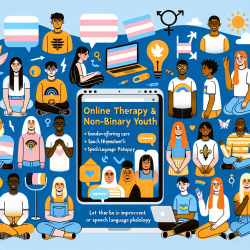The COVID-19 pandemic has posed significant challenges for many communities, particularly for people with disabilities and their caregivers. The research article "Person-reported perspectives on support availability for people with disabilities during the COVID-19 pandemic in Quebec" sheds light on these challenges and offers valuable insights for practitioners in the field of special education and therapy services.
Understanding the Challenges
The study highlights that during the pandemic, community support systems were often unavailable or insufficiently adapted to meet the needs of autistic individuals and those with disabilities. Approximately 40% of these individuals and 44% of their caregivers reported experiencing high levels of stress, a rate significantly higher than that of the general population during non-pandemic times.
This increased stress is attributed to the lack of adapted healthcare services, educational resources, and community support. The absence of tele-healthcare and in-home support services further exacerbated the situation, highlighting a critical need for improved service delivery.
Implementing Research Outcomes
Practitioners can play a pivotal role in mitigating these challenges by implementing several key strategies:
- Expand Tele-healthcare Services: As tele-healthcare has proven to be a promising strategy, practitioners should advocate for its expansion to ensure continuous access to healthcare services for people with disabilities.
- Enhance In-home Support: Providing in-home support services can significantly reduce stress levels among caregivers and individuals with disabilities. Practitioners should work towards facilitating these services where possible.
- Adapt Educational Resources: Ensuring that educational materials are accessible and tailored to meet the needs of students with disabilities is crucial. This includes providing necessary equipment for online learning.
- Strengthen Social Support Networks: Encouraging community engagement and building robust social support networks can act as a buffer against stress. Practitioners should foster connections between families and community resources.
Encouraging Further Research
The findings from this study underscore the importance of continued research into the specific needs of people with disabilities during crises. Practitioners are encouraged to engage in further research to explore innovative solutions that can be implemented to improve service delivery and reduce stress levels among this vulnerable population.
To read the original research paper, please follow this link: Person-reported perspectives on support availability for people with disabilities during the COVID-19 pandemic in Quebec.










